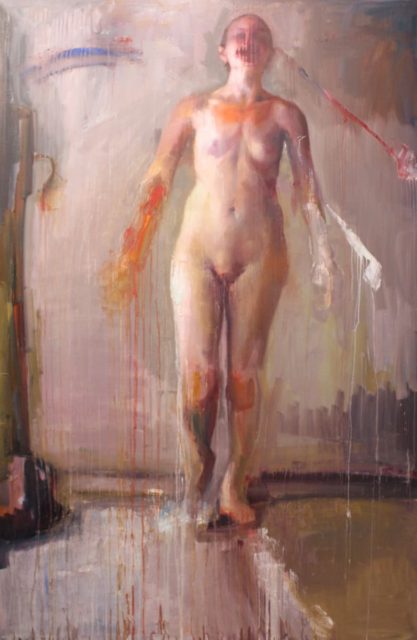Hagit Barkai (Israeli)
All Stories: End with Peak, 2011
Oil on Canvas
78″ x 52.25″ x 1.75″
Gift of Lydia Lorenzin, in memory of Tomm Lorenzin, Class of 1992
As a Gender & Sexuality Studies major, I am drawn to artists that examine the consequences of power dynamics. Hagit Barkai, an Israeli artist now living in Houston, TX, explores the demands on bodies in public and private spaces through her paintings. Barkai received her BA in philosophy at the Hebrew University of Jerusalem and MFA at Penn State University. We are fortunate to have her painting All Stories: End with Peak (2011) as a permanent piece in our collection. This work addresses the cultural objectification of female bodies while simultaneously preserving the dignity of the figure. While the subject matter is horrifying, the painting itself is beautiful, drawing you into the conversation. We can assume the subject is in a place of privacy within the painting, yet her body still expresses the consequences of public life.
Around the world, women are treated as sexual objects and reduced to body parts. Barkai addresses this issue in All Stories: End with Peak and highlights the intimate effects of this public injustice. Barkai invites us to examine the figure’s body before her identity. In her painting, the artist adds detail to the torso, drawing your eye to the woman’s body. The female figure’s shape is the most defined aspect in the painting, while the arms and lower legs are more abstract. The blurring marks on her face further solidify the notion that a woman’s worth is rooted in her sexuality, not her identity. Barkai painted her figure nearly lifeless to emphasize the perceived insignificance of a woman’s being. Her lifelessness is also indicative of an emotional exhaustion the subject experiences as a result of being debased. Barkai pushes us to view the woman the way society does as we are complicit in this culture. The painting depicts the woman in solitude, internalizing that objectification. She is only able to imagine herself as an unidentifiable entity intended for our gaze.
Michaela Gibbons ’22

